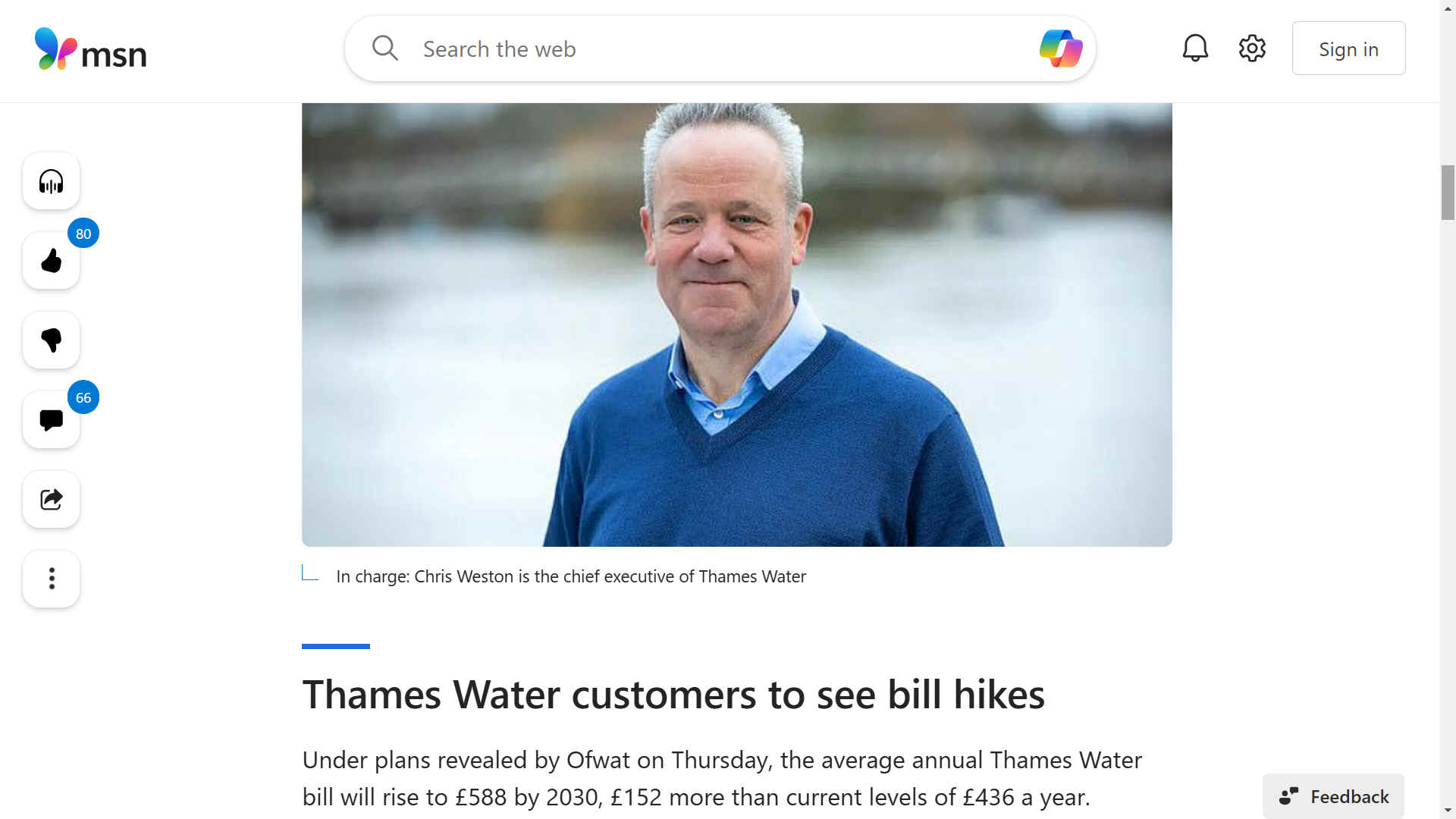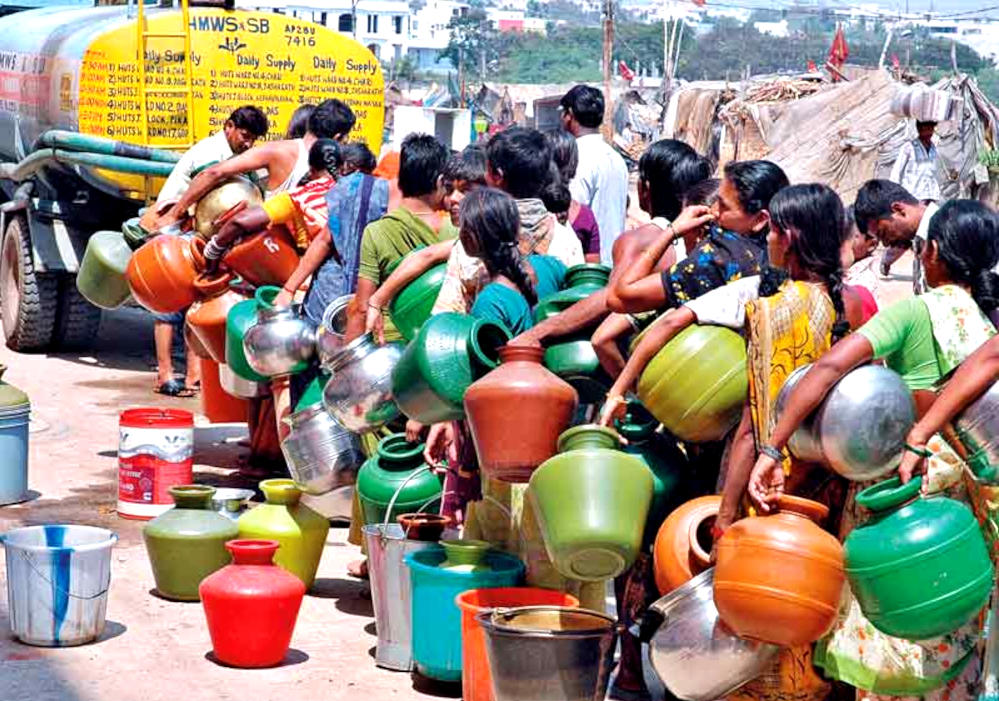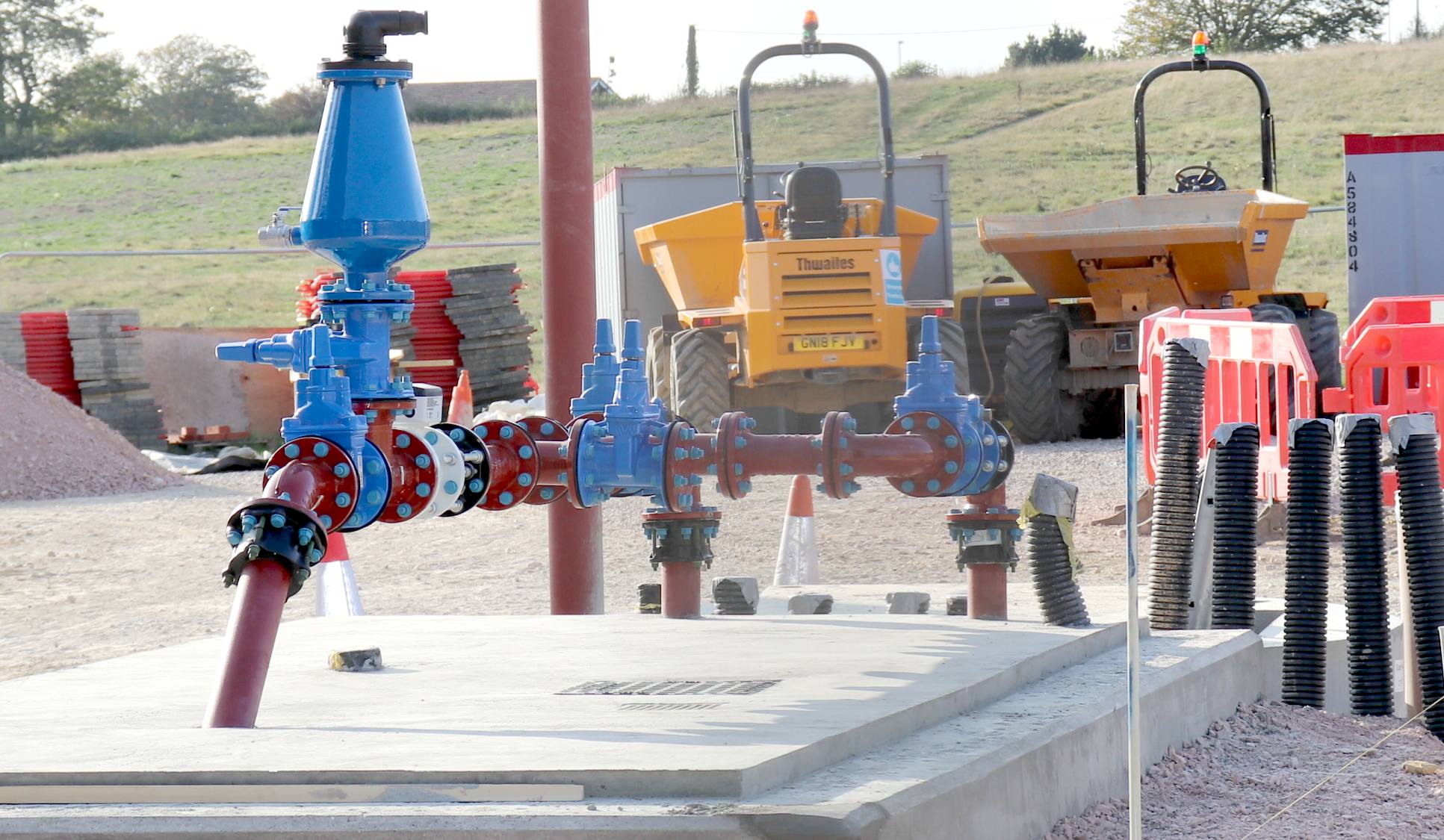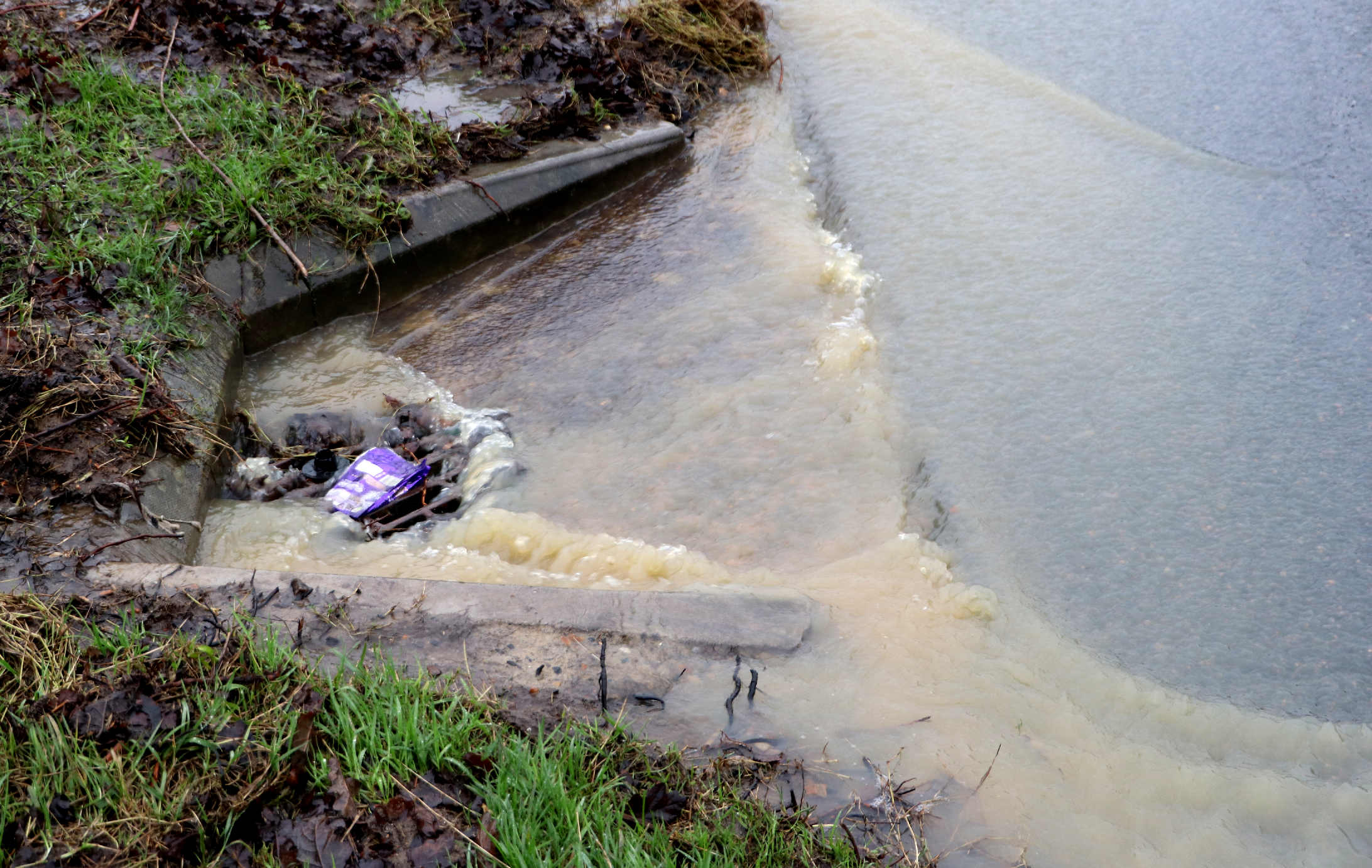
It
appears to us that the British public is being asked to pay for
management incompetence, to fund dividends for overseas investors. With
Oftwat saying customers should pay for the privilege! WTF!
Can
that be right, or are the Dirty Dozen defrauding customers by trading
insolvent?
Has
nobody heard of water neutrality?
Rachel
Reeves, the so-called 'Vampire Chancellor' is also writing cheques the UK cannot cash, with plans to issue
£300 billion in gilts, that the taxpayer cannot afford. Adding another
£6.4 billion in interest payments to the already high £102 billion a
year. It is financial suicide on a grand scale, designed to get herself
and the Labour party through their term in office, then hand over a
dreadful economy to the next government to cure. Hopefully, a Reform UK
government. To put a stop to all this nonsense.
In
2021 Southern Water were fined £90 million pounds for dumping up to 21 billion
liters of untreated sewage over six years into protected seas off England’s southern coast.
In 2024 Thames Water were fined £18 million for paying out dividends
while some £16 billion in debt.
It
sure seems like a case for re-nationalisation of our utilities. Where
both water and electricity
companies that are privately owned, have consistently failed to invest
in the future. Governments have been slow to act to stem the tide of
untreated sewage being dumped in rivers and the ocean, and the high price of energy to the
consumer.
Why
have governments been so slow to act? It is alleged, because of
procurement fraud, and conflicts of interests, where many MPs and their
constituents may have been benefiting from dividends that should never
have been authorised by Chief Executives on the make. Presumably, with
the top management being awarded bonuses and the like for what amounts
to failure.
Instead of being sacked, investigated for corrupt practices and replaced
with new management, who might be up to the challenges, with the public
interest at the top of their agendas.
For
example, no new houses should be built that add to the sewage and fresh
water supply burden. There should be water and waste neutrality. Or,
don't build any more executive houses, where there is a lack of
genuinely affordable units.

So,
please leave ours alone : )
THE DIRTY DOZEN - THE 12 WATER & SEWERAGE COMPANIES IN THE UK:
1. Anglian Water - East of England
2. Northumbrian Water - North East England
3. Severn Trent Water - West Midlands, East Midlands, Chester
4. Southern Water - South East England 5. South West Water - South West England
6. Thames Water - Greater London, Thames Valley
7. United Utilities - North West England
8. Welsh Water (Dŵr Cymru) - West Midlands, Wales
9. Wessex Water - South West England
10. Yorkshire Water - Yorkshire and the Humber
11. Affinity Water - Central region (e.g., Amersham, Barnet, Beaconsfield)
12. Albion Water - Knowle Village (Hampshire), Oaklands Hamlet (Chigwell), Upper Rissington (Gloucestershire)

WE
ALL NEED TO DRINK - In some countries there are no groundwater
pipes. Water is too valuable. Sometimes more expensive than petroleum.
Water tanker keep the human population hydrated. But it is demanding and
increases carbon footprints, where diesel is used for transport.
THE
ESSENTIAL (WATER & ELECTRICITY) RE-NATIONALISATION AND MODERNISATION
ACT 2025
Part 1: General Provisions
This Act recognises that the provision of essential utilities, namely water and electricity, is a public good and that their efficient and reliable delivery is crucial for the economic and social well-being of the
United
Kingdom. It seeks to address the failures of the current privatised models, which have resulted in
under-investment, environmental damage, and excessive profit-driven behaviour.
1. Key Provisions (Purpose)
a)
To ensure water and electricity utilities invest adequately in infrastructure modernization.
b) To restore these utilities to public ownership in cases of severe breaches of
conditions, deemed or implied.
2. Re-nationalisation:
a) The government shall re-nationalise the water and electricity sectors in England and
Wales wherever privatised models fail to act for the public good.
b)
Existing private companies shall be acquired by the government through a fair and transparent process, with compensation determined by independent valuation.
c)
Deductions, fines and penalties against excessive salaries and
bonuses for executives who give dividends to shareholders, while trading
insolvent or with excessive debt burdens and consequent interest
payments, leading to overprices water supply and treatments, shall be
taken into account by any independent valuers, so reducing the value of
a utility that is under-performing, and those company's net worth.
d)
Trading insolvent or with excessive debts such as to render a company
irrecoverable, except at the unreasonable expense of customers who do
not have a choice as to supplier, such as with water companies, shall be
deemed fraudulent trading, with salaries paid to company employees to be
treated as proceeds of crime.
3.
Public Ownership and Control:
a)
The re-nationalised utilities shall be owned and operated by publicly-owned companies, accountable to Parliament and the public.
b)
These companies shall be governed by a board of directors (acting as
trustees) appointed by the government, with a focus on public service delivery and environmental sustainability.
4. Definitions
a) Utilities: Entities responsible for providing water and electricity services.
b) Infrastructure Modernization: Upgrading and maintaining facilities and systems to improve service delivery.
Part 2: Regulatory Measures
1.
Mandatory Investment Requirements in Infrastructure:
a)
Significant investment shall be made in modernising and expanding essential infrastructure, including:
i)
Water: Upgrading and expanding water treatment plants, reducing leakage, and improving sewage infrastructure.
ii)
Electricity: Expanding renewable energy generation, upgrading the grid, and investing in energy storage
technologies, including conversion to green
hydrogen and green methanol.
b)
Funding for these investments shall be secured through a combination of retained profits, government investment, and potentially through a modest consumer levy.
2. Consumer Protection:
Prioritise affordability and consumer protection by:
a)
Setting fair and affordable prices for water and electricity.
b)
Protecting vulnerable consumers from energy poverty.
c)
Ensuring transparency and accountability in pricing and service delivery.
3. Environmental Sustainability:
a)
Implement stringent environmental standards to protect water resources and reduce carbon emissions.
b)
Promote the transition to a sustainable and low-carbon energy system.
4. Worker Rights and Conditions:
a)
Ensure fair pay and working conditions for all employees of the re-nationalised utilities.
b)
Protect existing employee rights and pensions.
5. Implementation:
a) The government shall establish a dedicated agency to oversee the re-nationalisation process and the operation of the re-nationalised utilities.
b)
A comprehensive public consultation process shall be undertaken to gather input from stakeholders, including consumers, employees, and environmental groups.
c) Utilities operating in compliance of deemed or implied conditions must allocate a minimum percentage of annual profits towards infrastructure
modernization, before contemplating dividends to pre-existing
shareholders, assuming that insolvent trading is not an issue and that
water supplies and treatments are reasonably priced, with no discharges
of untreated waste in rivers and seas.
6. Penalties for Non-Compliance
a) Significant fines for utilities failing to meet investment requirements.
b) Mandatory public disclosure of investment activities and financial statements.
Part 3: Conditions for Re-Nationalization
1.
Breach of Conditions
a) If utilities are found to be non-compliant with investment requirements or engaging in harmful practices (e.g., dumping sewage).
b) Conditions that could trigger re-nationalization include persistent financial mismanagement, environmental violations, and failure to invest in renewable energy sources.
2. Re-Nationalization Process
a) Outline a clear procedure for the government to take control of utilities.
b) Provisions for fair compensation to shareholders, if applicable.
c) Establishment of a public body to manage and operate re-nationalized utilities.
Part 4: Future-Proofing and Sustainability
1.
Renewable Energy Integration
AI,
Artificial and Smart Intelligence automation, with human oversight for
AI recommended implementations
Incentivize the integration of renewable energy sources into the grid.
Investment in energy storage solutions to enhance grid stability and reduce consumer energy prices.
2. Transparency and Accountability
Regular audits and public reports on the performance and financial health of utilities.
Mechanisms for public and stakeholder engagement in decision-making processes.
Please
note that this is a first draft of the proposed Bill.

CONTACTS
....

SEPTEMBER
17 2020 - Shit handling pipes, installation at Shit
Creek, Herstmonceux, the field adjacent is to be built on with 70
- 140 houses flushing excrement down a network of pipes, but of even more
concern is the pollution from the run off of pesticides from 70 gardens
and garages, through Lime
Pond. In that Southern Water are providing the infrastructure to
make that pollution a reality, they may be held to be vicariously
liable. If any of the soil pipes from the proposed houses were to leak
into the pond, or poison a local historic well, they would be criminally liable for sure, and may be
fined, or imprisoned. Why then was this installation given the go-ahead,
when this company is pumping raw sewage into the English Channel?
THE WATER (SPECIAL MEASURES) BILL 2024
The Water (Special Measures) Bill was introduced in the House of Lords on 4 September 2024, and was amended at committee stage and report stage. It was introduced in the House of Commons on 27 November 2024, and its second reading is scheduled for 16 December 2024.
The government has published a policy statement explaining the bill in more detail, as well as explanatory notes (PDF) and a delegated powers memorandum (PDF). It published an impact assessment on 25 October 2024
(PDF).
Why has the bill been introduced?
The bill is intended to address poor performance from water companies. This covers poor financial management, water pollution, and outcomes for customers. In the second reading of the bill in the Lords, Baroness Hayman said that the government was introducing the bill “to drive rapid and meaningful improvements in the performance and culture of the water industry” in response to a lack of public trust in the water industry and widespread concerns about underinvestment in infrastructure, pollution levels and ongoing sewage spills.
In its assessment of water company performance for 2023–2024, Ofwat (the economic regulator for the water sector in England and Wales) did not identify any water companies as falling within its ‘leading’ category; most were average, and three were ‘lagging behind’ (Anglian Water, Dŵr Cymru and Southern Water). In its monitoring report of financial resilience for 2023–2024, 10 of the 17 companies assessed were below the ‘standard’ rating, with three in the most serious ‘action required’ category (Thames Water,
South East Water and
Southern Water). Over the past two years, water companies reportedly paid out £2.5 billion in dividends.
The government has repeatedly said that it has no plans to renationalise the water sector. Environment Secretary, Steve Reed, has said that he has ruled out nationalisation as “it would not resolve the problems we face” and that this “would cost towards £100 billion of public money”.
What would the bill do?
The long title is “a bill to make provision about the regulation, governance and special administration of water companies.” These provisions will enable the government and regulators to block the payment of bonuses for water company executives, bring criminal charges against those who break the law, enable automatic and “severe” fines, and ensure the monitoring of every sewage outlet. It applies to England and Wales.
The Water (Special Measures) Bill is set out by government as the first step towards broader change across the water sector. It forms part of the Labour government’s commitment to “put failing water companies under tough special measures”, which was also included in the party’s 2024 election manifesto.
The supporting policy statement for the bill notes that the bill “is not the full extent of the government’s ambition, with wider transformative change across the whole water sector to follow”. On 23 October 2024, the government launched its Independent Commission for water, which will report back to government in 2025 with recommendations on how to tackle “inherited systemic issues in the water sector”, forming the basis for further legislation.
The bill has four key aims:
- block bonuses for water company executives “who pollute our waterways”
- bring criminal charges against “persistent law breakers”
- impose automatic and “severe” fines for wrongdoing
- enable independent monitoring of every sewer overflow outlet
Blocking bonuses for water company executives
The bill would create a new framework for holding companies and chief executives accountable for water company governance and remuneration. These provisions would enable the regulator Ofwat to set rules for water companies, subject to certain requirements included in the legislation (including a consultation).
Bringing criminal charges
The bill would introduce three provisions where an investigation by Ofwat or the Environment Agency had been obstructed by a water company. It would enable the courts to include imprisonment as a sanction, enable hearings in the Crown Court, and enable executives and directors to be prosecuted where an offence had been committed with their consent, connivance or due to their neglect.
Imposing fines
The bill would enable fixed monetary penalties to be imposed for specific offences, including pollution, failure to comply with information and reporting requests, and offences relating to water resources. These provisions would also enable the government to specify the list of these offences and the monetary value of penalties in secondary legislation.
The bill would also lower the “standard of proof” required for minor to moderate water company offences to the “civil standard”.
The bill also includes provisions to enable the Environment Agency and Natural Resources Wales to recover costs from water companies following enforcement actions.
Monitoring of sewer overflows
The bill would require water companies to publish information on the frequency and duration of all emergency storm overflows within an hour of a discharge taking place.
Wider work to strengthen regulation
In addition to the four main provisions, the bill would also introduce a new statutory requirement for water companies in England to publish annual ‘pollution incident reduction plans.’
The bill would allow the Secretary of State to modify water company licences to recover a shortfall in government costs if a water company were to enter special administration, with equivalent powers for Welsh Ministers.
Progress of the bill
The bill was introduced in the Lords on 4 September 2024 and its second reading took place on 9 October 2024.
Committee stage in the Lords was held over three sittings (on 28 October 2024, 30 October 2024 and 4 November 2024). At committee stage, five government amendments were made and there were no divisions on any amendments.
Report stage was held on 20 November 2024. At report stage, 34 government amendments were made, all of which were agreed to. Four amendments from other parties were voted on, two of which were agreed and two of which were disagreed.
Third reading took place on 26 November 2024, and the bill was passed and sent to the Commons. It was introduced in the Commons on 27 November 2024 and its second reading is scheduled for 16 December 2024.
Stakeholder reactions
The bill has been broadly welcomed by Members of the House of
Lords, environmental and customer groups, although all these stakeholders have raised criticisms of some of the provisions.
Members of the House of Lords scrutinised the bill line by line, and raised concerns around the broad nature of some of the measures included, as well as criticising the current state of the water sector. The two notable opposition party amendments that were agreed at report stage in the Lords were to introduce reporting requirements around ‘financial engineering’ of water company finances and to require any rules on performance-related pay to be subject to affirmative procedure.
Environmental groups, including the Wildlife and Countryside Link consortia, have supported the bill’s aims and have encouraged Members of the House of Lords to introduce more stringent requirements, particularly in relation to pollution reporting and mitigation. The Consumer Council for Water has said that it looks forward to giving people and communities “a more powerful platform to hold water companies to account”.
Water companies have been less supportive of the bill. Some companies have said that the measures proposed around executive pay would create a challenge to investment and talent retention within the sector. However, the trade body Water UK welcomed the launch of the government’s Independent Commission alongside the bill and acknowledged that “the current system is not working and needs major reform”.

JANUARY
2025 - Southern
Water and East Sussex County Council control highways drainage, pothole
and other road maintenance. What this shows is that there is plenty of
water in the south of England, if only it was properly managed.
Water companies have been pandering to wealthy property developers and
councils who are only really interested in the build of executive
housing, to scoop in as much short term revenue as they can to bolster
their pension funds. Even though, the shortage of affordable housing is
costing them money in benefit payments. It's all very Margaret
Thatcher thinking. Leading to discontent, an example of which is the
Poll Tax riots.

JANUARY
2025 - The river A217, represents money down the drain for investors if
water, and more proof of climate change. Copyright photographs ©
Injustice Alliance 5th January 2025. All rights reserved, except for
educational use in schools and colleges.



